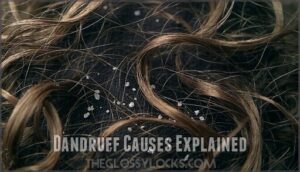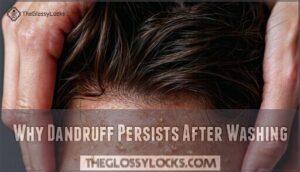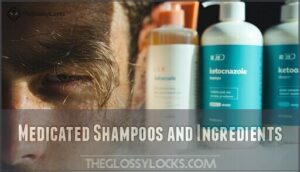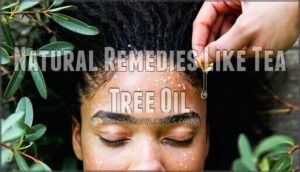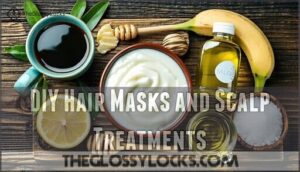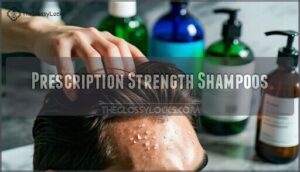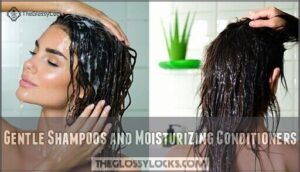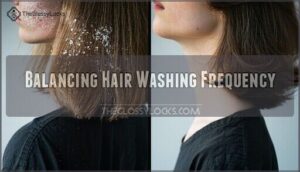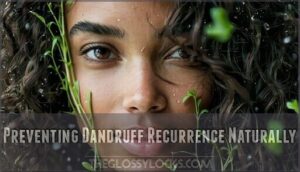This site is supported by our readers. We may earn a commission, at no cost to you, if you purchase through links.
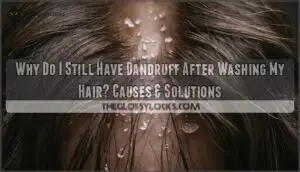 You’re still seeing dandruff after washing your hair because regular shampoos often don’t target the real culprits.
You’re still seeing dandruff after washing your hair because regular shampoos often don’t target the real culprits.
The persistent flakes might be caused by a stubborn fungus called Malassezia, an overly dry scalp, product buildup, or underlying skin conditions like psoriasis.
Your washing technique matters too—scrubbing too hard or using water that’s too hot can irritate your scalp further.
Even your stress levels and diet play surprising roles in dandruff production.
Think of your scalp as a garden that needs the right balance, not just a quick rinse, to finally help you wave goodbye to those snowflakes with the right anti-dandruff ingredients.
Table Of Contents
- Key Takeaways
- Dandruff Causes Explained
- Why Dandruff Persists After Washing
- Effective Dandruff Treatments Available
- Managing Dandruff Through Hair Care
- Preventing Dandruff Recurrence Naturally
- Frequently Asked Questions (FAQs)
- Why is dandruff still in my hair after washing it?
- How do you get rid of dandruff even if you wash your hair?
- Why is my dandruff not going even after shampoo?
- Can changing my diet reduce dandruff symptoms?
- How does stress impact dandruff severity?
- Are there any hair styling habits that exacerbate dandruff?
- Can hard water contribute to persistent dandruff?
- Is it possible for certain hairstyles to worsen dandruff?
- How long before dandruff treatments show results?
- Can certain hairstyles worsen dandruff conditions?
- Conclusion
Key Takeaways
- Your dandruff persists because regular shampoos don’t target the root causes like Malassezia yeast overgrowth or skin conditions like psoriasis or eczema.
- Washing techniques matter—scrubbing too hard, not rinsing properly, or using harsh water can make flakes worse.
- Anti-dandruff shampoos with ingredients like ketoconazole, zinc pyrithione, or selenium sulfide work best to tackle persistent dandruff.
- Lifestyle factors like stress, diet, and product buildup can disrupt your scalp’s balance and worsen dandruff.
Dandruff Causes Explained
Dandruff often happens because of an imbalance in your scalp’s ecosystem, such as an overgrowth of Malassezia yeast or conditions like psoriasis and eczema.
These factors speed up skin cell turnover, leaving you with those annoying flakes no matter how often you wash your hair, due to the imbalance.
Malassezia Yeast Overgrowth
A key culprit behind dandruff is Malassezia yeast, especially Malassezia globosa.
This yeast thrives on your scalp’s natural oils, or sebum, causing an overgrowth that triggers an immune response.
The result? Irritation, flakes, and itchiness.
To manage it, try antifungal shampoos designed to control fungal activity.
Regular use helps keep this pesky yeast in check and maintains scalp balance.
Scalp Microbiome Imbalance
Your scalp microbiome is like a bustling ecosystem, and when it’s out of balance, dandruff flourishes.
Malassezia yeast thrives on excess sebum production, upsetting microbiome diversity and disrupting scalp pH.
This imbalance weakens your scalp’s immune response, making it vulnerable to fungal infections.
To control yeast overgrowth, gently cleanse and use products supporting healthy microbiome diversity and oil regulation.
Skin Conditions Like Psoriasis
Sometimes, stubborn flakes stick around because of scalp conditions like psoriasis.
Psoriasis triggers inflammation, leading to itchy, scaly patches called scalp psoriasis—easily mistaken for regular dandruff.
Psoriasis symptoms include silver-white scales and redness, often requiring more than standard dandruff treatment.
Managing psoriasis involves specialized shampoos, topical creams, and medical advice.
Addressing scalp psoriasis guarantees relief while reducing frustration.
Eczema and Contact Dermatitis
Eczema and contact dermatitis can trigger scalp irritation, leaving flakes and itchiness despite washing. This happens when your skin reacts to irritants or allergens.
Here’s how to manage it:
- Avoid contact allergens in hair products.
- Stick to a moisturizing routine daily.
- Use steroid creams for itch relief if prescribed.
- Watch out for eczema triggers like stress.
- Consult a dermatologist for persistent skin irritation.
Consider natural eczema remedies for soothing relief.
Why Dandruff Persists After Washing
Washing your hair doesn’t always fix dandruff—frustrating, right? Persistent dandruff often hints at underlying problems, like shampoo ineffectiveness or product buildup that blocks proper cleansing.
Sometimes, harsh washing techniques can irritate your scalp, making flakes worse. Other dandruff causes include scalp sensitivity or conditions like psoriasis and eczema, which don’t vanish just because you’ve shampooed.
Here’s why dandruff might stick around:
| Issue | Cause | Effect | Solution |
|---|---|---|---|
| Product buildup | Excess styling products | Flakes, oily scalp | Use clarifying shampoo |
| Shampoo ineffectiveness | Weak formula, wrong choice | Persistent flakes | Try an antidandruff shampoo |
| Washing technique | Over-scrubbing or lack of rinsing | Scalp irritation, redness | Use gentle motions |
| Underlying conditions | Psoriasis or eczema | Chronic dandruff | Seek medical advice |
Understanding these triggers can help you tackle flaky frustrations effectively.
Effective Dandruff Treatments Available
You don’t have to put up with stubborn dandruff, even when regular washing hasn’t solved the problem.
From medicated shampoos to natural remedies, several effective treatments can help restore balance to your scalp and keep flakes at bay.
Medicated Shampoos and Ingredients
If dandruff won’t quit, grab a medicated shampoo.
Look for ingredients like ketoconazole, selenium sulfide, or zinc pyrithione—these target the root cause: fungal overgrowth.
Coal tar slows skin shedding, while salicylic acid breaks down stubborn flakes.
Rotating shampoos can keep dandruff guessing.
Effective treatment involves ketoconazole based cleansers.
Stick with it for consistent results—your scalp will thank you, with ketoconazole being a key component and using it as part of a treatment plan.
Natural Remedies Like Tea Tree Oil
Tea tree oil, a popular natural remedy, offers antifungal benefits that tackle dandruff at its root.
Diluting it with carrier oils like coconut minimizes irritation while boosting hydration. You can purchase tea tree oil from many retailers.
Apply this mixture to your scalp and rinse after 10-30 minutes for effective results. However, patch test first as sensitive skin may react, making this a reliable dandruff treatment option.
DIY Hair Masks and Scalp Treatments
Creating DIY hair masks can make your scalp feel brand new.
They hydrate, nourish, and fight stubborn dandruff. Use natural ingredients like yogurt, tea tree oil, or coconut oil for scalp treatments.
Massage masks in gently and apply weekly for best results. Many people find that natural oils moisturize the scalp effectively.
- Yogurt + Lemon: Soothes and balances scalp.
- Green Tea + Honey: Hydrates deeply.
- Coconut Oil + Sugar Scrub: Exfoliates build-up.
- Banana + Olive Oil: Moisturizes for softer hair.
Prescription Strength Shampoos
If over-the-counter options haven’t worked, prescription treatments like antifungal shampoos with ketoconazole or selenium sulfide might help.
These are stronger, targeting stubborn dandruff effectively. A good option is to evaluate ketoconazole shampoo products.
Side effects can include dryness or irritation, so follow usage guidelines carefully. Zinc pyrithione is another option, but always consult your doctor before long-term use.
Comparing efficacy guarantees the right treatment for lasting relief.
Managing Dandruff Through Hair Care
You can manage dandruff more effectively with simple changes to your hair care routine.
Using the right shampoos, balancing how often you wash, and avoiding harsh products can make a big difference.
Gentle Shampoos and Moisturizing Conditioners
Using gentle, sulfate-free shampoos keeps the scalp happy without stripping its natural oils.
Pair with moisturizing conditioners rich in hydrating ingredients like aloe or glycerin to maintain scalp moisture. Proper product application matters—massage them into your roots gently.
To further enhance your routine, consider how to choose the right conditioner for your specific hair type.
Over time, this combo soothes an itchy scalp, tackles dryness, and boosts dandruff treatment effectiveness for long-term effects, leading to a more effective hair care routine.
Balancing Hair Washing Frequency
Finding the right hair washing frequency can feel tricky, but balance is key.
Overwashing can strip oils, causing a dry scalp, while infrequent washing leads to scalp buildup and dandruff.
- Wash fine, oily hair every 1-2 days.
- For textured or dry scalp, extend to 5-7 days.
Always match shampoo type to your scalp’s needs for healthy hygiene.
Avoiding Harsh Styling Products
Be mindful of hair products like hair sprays, gels, and mousses that contain harsh chemicals.
These can irritate your scalp, causing product buildup and worsening dandruff.
Opt for alcohol-free alternatives and practice gentle styling techniques.
Regularly cleaning your brushes helps, too, ensuring no residue lingers.
A little care goes a long way for a happy, flake-free scalp!
Regular Scalp Massage and Steam Treatment
A quick scalp massage boosts circulation, promoting oil absorption and helping with an itchy scalp.
Add some steam hydration, like using a warm towel, for better dandruff treatment.
Remember, consistency matters—treatment frequency is your friend here.
Pairing regular massages with scalp steam can soften flakes and soothe irritation, refining your dandruff care routine in a simple way.
Preventing Dandruff Recurrence Naturally
You can prevent dandruff from making a comeback by keeping your scalp clean, balanced, and moisturized.
Small tweaks like eating a scalp-friendly diet and managing stress can make a big difference over time.
Maintaining Scalp Hygiene and Balance
Scalp hygiene is key to maintaining scalp balance and preventing dandruff.
Keep your scalp’s pH in check, avoid product buildup, and make certain proper brush hygiene.
Aim for a healthy scalp by:
- Washing frequently enough to manage oil without stripping hydration levels.
- Cleaning hairbrushes regularly to avoid flakes.
- Choosing pH-balanced shampoos to support scalp health.
Consistency makes all the difference! You can also improve your scalp health by limiting styling product use.
Managing Stress and Dietary Changes
Stress can throw your scalp into overdrive, leading to stress dandruff.
I’ll create a short, engaging blockquote about stress and dandruff in the same professional but conversational tone as the content:
When stress levels spike, your scalp rebels—sending dandruff flakes as distress signals.
A hair-healthy diet rich in omega-3s and avoiding trigger foods like sugar can reduce flare-ups.
Hydration levels are essential for maintaining scalp balance, while good gut health combats nutritional deficiencies linked to diet and dandruff.
Reducing stress through hobbies or walks helps calm both nerves and flakes.
Monitoring for Skin Condition Flare-Ups
Early warning signs can help you catch skin condition flare-ups before dandruff takes over your scalp again.
Keep a simple tracking system to identify triggers and manage symptom severity.
- Note environmental changes (weather shifts, new locations)
- Record product usage and reactions
- Document stress levels and their correlation with flare-ups
- Track dietary patterns that may impact scalp conditions
Regular monitoring enables early intervention and targeted lifestyle adjustments for better scalp care, leading to improved management of scalp conditions.
Using Anti-Dandruff Shampoos Regularly
While watching for flare-ups helps catch dandruff early, consistency with anti-dandruff shampoos is your best defense.
For lasting results, look for key shampoo ingredients like zinc pyrithione or ketoconazole in your scalp treatments.
Apply these products correctly—massage thoroughly into your scalp, let sit for 3-5 minutes, then rinse completely.
Consider product rotation to prevent resistance, and maintain usage frequency even when symptoms improve.
Most antifungal shampoos show long-term effects with regular use.
Frequently Asked Questions (FAQs)
Why is dandruff still in my hair after washing it?
Like stubborn snowflakes on a winter coat, dandruff persists after washing due to Malassezia yeast overgrowth, ineffective shampoo, improper washing technique, or underlying scalp conditions that require specialized treatment.
How do you get rid of dandruff even if you wash your hair?
Use anti-dandruff shampoos containing zinc pyrithione or ketoconazole, leaving them on your scalp for 5 minutes before rinsing.
Try alternating between different formulas and wash your hair regularly to manage persistent dandruff.
Why is my dandruff not going even after shampoo?
Regular shampoo mightn’t treat the underlying causes like fungal overgrowth or skin conditions.
You’re probably using the wrong product.
Try anti-dandruff shampoos with ingredients like ketoconazole, zinc pyrithione, or selenium sulfide instead.
Can changing my diet reduce dandruff symptoms?
You are what you eat, especially in relation to your scalp.
Reducing inflammatory foods and increasing omega-3s, zinc, and B vitamins in your diet can help reduce dandruff symptoms substantially.
How does stress impact dandruff severity?
Stress triggers hormonal changes that can increase oil production on your scalp, creating an ideal environment for dandruff-causing yeast to thrive.
When you’re stressed, you’ll often notice your flakes becoming more visible and persistent, which can be attributed to the hormonal changes.
Are there any hair styling habits that exacerbate dandruff?
Like adding fuel to the fire, your styling habits might worsen dandruff. Excessive product use, infrequent brush cleaning, heat styling, and tight hairstyles can irritate your scalp and trigger flaking.
Can hard water contribute to persistent dandruff?
Hard water can leave mineral buildup on your scalp, making it harder for shampoo to work effectively.
This buildup can dry out your scalp or worsen oiliness, both of which might contribute to stubborn dandruff.
Is it possible for certain hairstyles to worsen dandruff?
Tight ponytails, heavy braiding, or constantly pulling hair can irritate your scalp, worsening dandruff.
When hairstyles trap sweat or limit air circulation, your scalp stays oily or damp, creating a perfect playground for yeast to thrive.
How long before dandruff treatments show results?
You’ll typically notice improvements within 2-4 weeks of regular dandruff treatment.
Stick with medicated shampoos, follow instructions carefully, and be consistent.
If nothing changes after a month, it’s a good idea to see a dermatologist.
Can certain hairstyles worsen dandruff conditions?
Did you know 50% of adults face dandruff?
Tight hairstyles trap oil and sweat, worsening flakes.
Loosen up, avoid excessive product buildup, and let your scalp breathe—it’s a simple fix for healthier roots!
Conclusion
Dandruff can feel like the most stubborn houseguest, refusing to leave no matter how often you wash your hair.
If you’re still wondering, "Why do I still have dandruff after washing my hair?" the answer lies in understanding its root causes, from Malassezia overgrowth to scalp irritation.
Focus on gentle care, anti-dandruff shampoos, and balancing your routine. With consistent effort and the right solutions, you’ll create a healthier scalp environment—and finally show those flakes the door.

